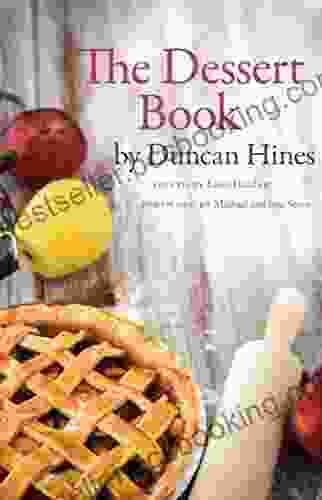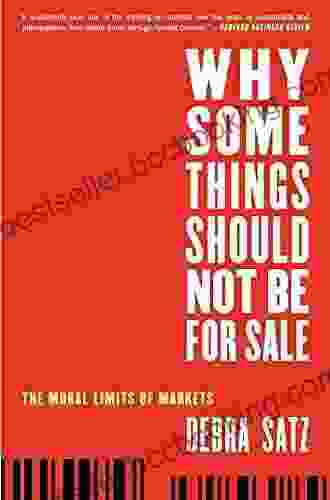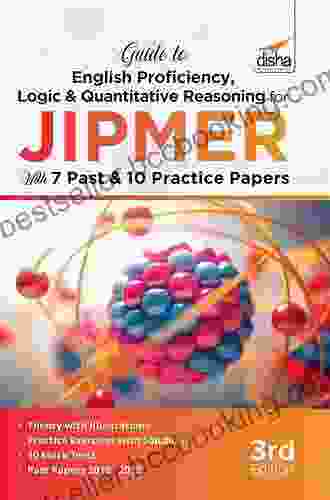Why Some Things Should Not Be For Sale: A Journey Through the Commodification of Human Life


: The Price of Life
In the realm of human experience, there exist certain aspects that transcend mere monetary value. These are elements that define our very essence, shape our identities, and form the foundation of our shared humanity. Yet, in the relentless pursuit of profit and material gain, society has encroached upon these sacred domains, reducing them to commodities that can be bought, sold, and traded like any other good.
4.3 out of 5
| Language | : | English |
| File size | : | 1048 KB |
| Text-to-Speech | : | Enabled |
| Screen Reader | : | Supported |
| Enhanced typesetting | : | Enabled |
| Word Wise | : | Enabled |
| Print length | : | 264 pages |
| Lending | : | Enabled |
The commodification of human life is a grave threat to our collective well-being. It undermines the dignity of individuals, erodes social cohesion, and perpetuates a cycle of exploitation and inequality. This provocative book delves into the multifaceted nature of this phenomenon, exposing its insidious consequences and challenging the prevailing ethos that values material wealth above all else.
Chapter 1: The Human Body as a Market
The human body, once considered a sacred temple, has become a lucrative commodity in the modern world. The rise of organ transplantation, genetic testing, and reproductive technologies has given rise to a thriving market where human organs, tissues, and genetic material are bought, sold, and profited from.
While these advancements have undoubtedly improved the lives of countless individuals, they have also raised profound ethical and moral dilemmas. The commodification of the human body commodifies human life itself, reducing it to a collection of parts that can be harvested and traded for monetary gain.
Chapter 2: The Exploitation of Labor
The relentless pursuit of economic growth has led to the widespread exploitation of human labor. In many parts of the world, workers are forced to toil in inhumane conditions, denied basic rights, and paid poverty wages. This commodification of labor degrades human beings to mere tools of production, stripping them of their dignity and autonomy.
The exploitation of labor is not confined to developing countries. Even in advanced economies, workers are subjected to wage theft, unsafe working conditions, and relentless pressure to maximize productivity. This systematic dehumanization undermines the fundamental rights and freedoms that are essential for a just and equitable society.
Chapter 3: The Education System and the Knowledge Economy
Education, once considered a path to enlightenment and social mobility, has become increasingly commodified in the knowledge economy. Universities and colleges have become profit-driven entities, prioritizing tuition revenue over academic excellence. The result is a system that perpetuates inequality, as access to higher education is increasingly limited to those who can afford it.
The commodification of education has also narrowed the curriculum, emphasizing subjects that lead to lucrative careers rather than fostering critical thinking, creativity, and ethical reasoning. This myopic focus on financial gain undermines the true purpose of education, which is to cultivate well-rounded individuals who contribute to the common good.
Chapter 4: The Art of Living and the Commercialization of Experience
In the relentless pursuit of novelty and excitement, society has commodified even the most intimate aspects of human existence. Relationships, travel, and personal growth have become products that can be Free Downloadd, consumed, and discarded. This commercialization of experience erodes the authenticity and meaning of life, reducing it to a series of transactions and fleeting pleasures.
The commodification of the art of living has also led to a culture of perpetual dissatisfaction. Constantly bombarded with images of unattainable lifestyles and experiences, individuals are left feeling inadequate and yearning for more. This consumerist mindset perpetuates a cycle of anxiety and unhappiness, undermining true contentment and fulfillment.
Chapter 5: The End of Human Relationships
The commodification of human life has profoundly impacted the nature of human relationships. In an era where everything has a price, genuine connections have become increasingly elusive. Relationships are often reduced to transactional exchanges, where individuals seek to maximize their own benefit rather than foster mutual growth and support.
The commodification of relationships has also led to a rise in social isolation and loneliness. As people become more focused on their own self-interest, they neglect the nurturing of meaningful connections. This social fragmentation undermines the sense of community and belonging that is essential for a healthy and fulfilling life.
Chapter 6: The Path to Reclaiming Our Humanity
The commodification of human life is a grave threat to our collective well-being. It undermines dignity, erodes social cohesion, and perpetuates a cycle of exploitation and inequality. However, it is not too late to reclaim our humanity and resist the forces that seek to reduce us to mere commodities.
This book offers a roadmap for a more just and equitable society, where human life is valued above material wealth and the sacred aspects of existence remain protected. It calls for a re-evaluation of our priorities, a return to ethical principles, and a renewed commitment to the common good.
By challenging the prevailing ethos of commodification, we can create a world where human beings are treated with the respect and dignity they deserve. The path to reclaiming our humanity begins with recognizing the true value of life itself, beyond its monetary worth. It is a journey that requires courage, compassion, and a deep belief in the inherent worth of every human being.
: A Call to Action
The commodification of human life is a cancer that is spreading through our society, threatening to destroy the very essence of what it means to be human. It is a challenge that demands our urgent attention and collective action.
This book is a wake-up call, a clarion call to resist the forces that seek to reduce us to mere commodities. It is a call to action, urging us to reclaim our humanity, to defend the sacred aspects of life, and to build a society that values human dignity above all else.
The future of humanity is in our hands. Let us choose the path of compassion, justice, and the preservation of what is truly priceless. Let us reject the commodification of human life and embrace the true meaning of human existence.
4.3 out of 5
| Language | : | English |
| File size | : | 1048 KB |
| Text-to-Speech | : | Enabled |
| Screen Reader | : | Supported |
| Enhanced typesetting | : | Enabled |
| Word Wise | : | Enabled |
| Print length | : | 264 pages |
| Lending | : | Enabled |
Do you want to contribute by writing guest posts on this blog?
Please contact us and send us a resume of previous articles that you have written.
 Book
Book Novel
Novel Page
Page Chapter
Chapter Text
Text Story
Story Genre
Genre Reader
Reader Library
Library Paperback
Paperback E-book
E-book Magazine
Magazine Newspaper
Newspaper Paragraph
Paragraph Sentence
Sentence Bookmark
Bookmark Shelf
Shelf Glossary
Glossary Bibliography
Bibliography Foreword
Foreword Preface
Preface Synopsis
Synopsis Annotation
Annotation Footnote
Footnote Manuscript
Manuscript Scroll
Scroll Codex
Codex Tome
Tome Bestseller
Bestseller Classics
Classics Library card
Library card Narrative
Narrative Biography
Biography Autobiography
Autobiography Memoir
Memoir Reference
Reference Encyclopedia
Encyclopedia Deborah Underwood
Deborah Underwood Derek J Flores R N
Derek J Flores R N Duane W Roller
Duane W Roller Doug Mchugh
Doug Mchugh Dino Thompson
Dino Thompson Donald B Mcfarlane
Donald B Mcfarlane Donald Keyn
Donald Keyn Diane Huth
Diane Huth Donald Woods Winnicott
Donald Woods Winnicott Donald F Kuratko
Donald F Kuratko Doki Cohen
Doki Cohen Derek Fridolfs
Derek Fridolfs Diana K Schwam
Diana K Schwam Deirdre Martin
Deirdre Martin Dr Edith Widder
Dr Edith Widder Donna Walker Kuhne
Donna Walker Kuhne Dominique Conil
Dominique Conil Dominick Dunne
Dominick Dunne Deontae Henderson
Deontae Henderson Department Of Defense
Department Of Defense
Light bulbAdvertise smarter! Our strategic ad space ensures maximum exposure. Reserve your spot today!
 Zadie SmithFollow ·18k
Zadie SmithFollow ·18k Julio Ramón RibeyroFollow ·18.2k
Julio Ramón RibeyroFollow ·18.2k Garrett BellFollow ·13k
Garrett BellFollow ·13k John ParkerFollow ·7k
John ParkerFollow ·7k Clarence BrooksFollow ·7.3k
Clarence BrooksFollow ·7.3k Jake CarterFollow ·2.2k
Jake CarterFollow ·2.2k Blake BellFollow ·3.3k
Blake BellFollow ·3.3k Lee SimmonsFollow ·19.2k
Lee SimmonsFollow ·19.2k

 J.D. Salinger
J.D. SalingerThe Quintessential American Cook: A Culinary Journey with...
Prologue: The Man...

 Franklin Bell
Franklin BellIntroducing Romanticism: A Literary Guide to the Romantic...
Romanticism was a...

 Denzel Hayes
Denzel HayesThe Untold And Inspiring Story Of Eric Liddell Hero Of...
The Olympian Who Defied...

 Oscar Wilde
Oscar WildeDiscover the Enchanting Adventure of Arthur Woody and the...
Immerse Yourself in a World of Mystery,...

 Fernando Bell
Fernando BellAlibaba: The House That Jack Ma Built
The Rise of the Chinese E-Commerce Giant ...

 Leo Tolstoy
Leo TolstoyCrossing Continents: A History of Standard Chartered Bank
By John M. Smith Crossing...
4.3 out of 5
| Language | : | English |
| File size | : | 1048 KB |
| Text-to-Speech | : | Enabled |
| Screen Reader | : | Supported |
| Enhanced typesetting | : | Enabled |
| Word Wise | : | Enabled |
| Print length | : | 264 pages |
| Lending | : | Enabled |












